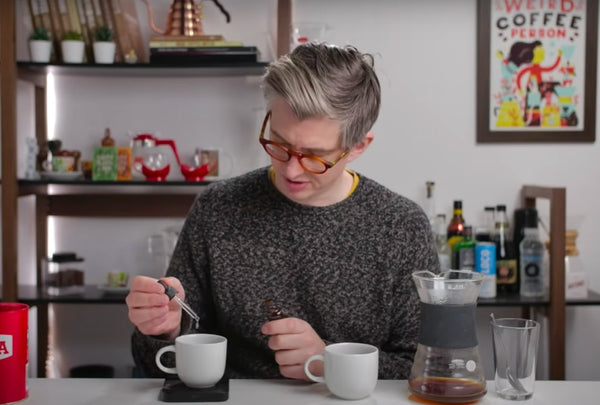Surprisingly, adding a pinch of salt to your coffee can help enhance the flavor profile and reduce any bitter aftertaste.
Many cultures have used salt instead of sugar to enhance the flavor in coffee. This is due to its sodium content which softens any potential bitterness and brings out the sweetness. Furthermore, adding a pinch of salt can make for a smoother body and richer texture in your cup of coffee!
Let's dive into the past and explore how coffee with salt came about, bolstered by insights from expert baristas James Hoffman and Scott Rao. We'll gain a better understanding of this unique combination through an exploration of Perfect Daily Grind's article on salty coffee.
Why do people in different cultures add salt to coffee?
For generations, individuals in different nations have been sipping on salted coffee as if it were the most normal thing in the world—much like we view our usual cup of coffee with milk and sugar.
Take Turkey for example, where the bride serves salty coffee to her fiancé and his family in a symbolic premarital rite. If the groom can acceptably finish it without expressing any displeasure, then it displays his readiness to stand by their union through thick and thin - making this an essential component of Turkish culture.
In Taiwan, a unique "sea salt coffee" is crafted by pouring salted milk foam atop an iced Americano to enhance the sweetness of the beverage. This delightful concoction has become ingrained in Taiwanese culture and can also be found accompanying watermelons or pineapples.
Salted milk foam coffee is the national drink in Taiwan. © wikihow.com
In Scandinavia, coffee is seasoned with salt after it's been brewed. Even more incredibly, some European countries situated near the shoreline use a mixture of salt and water to make their cups of coffee.
Who knew that the addition of salt to coffee would help balance its flavor profile, making it less bitter and more enjoyable?
According to Sara Markwart, head of the flavor at The Coffee Excellence Center, salt is the perfect additive for coffee because it heightens sweetness and preserves delightful scents. It's also a sensible alternative to milk or sugar if you're sensitive to bitter flavors.
In a 2009 episode of Good Eats, Alton Brown, renowned food science expert and host of the show, proposed adding salt to coffee as an effective means to neutralize its bitterness. He advised using 1/4 teaspoon of coarse sea or kosher salt for six teaspoons of ground coffee - it’s one simple trick that can instantly elevate your morning cup!
Not only does salt reduce bitter flavors, but it also masks musty tastes when water is stored in a sealed tank. Research has demonstrated that salt suppresses bitterness more proficiently than sugar," he declares..
Though he wasn't the originator of adding salt to coffee, Alton Brown's advocacy has brought it into the spotlight. Nowadays, some American coffee connoisseurs are familiar with this technique as "the Alton Brown trick."
The Scientific Rationale: How Bitterness and Salt Are Related
Although caffeine is the cause of a small portion of coffee's bitter taste, its main bitterness derives from two components: lactones formed by chlorogenic acid and Phenylindanes. These compounds are absent in green coffee beans, but become present as they undergo roasting due to the breakdown of chlorogenic acids.
As you darken the roast, phenylindanes produce a bitter taste that intensifies with every extra moment of roasting. Consequently, the darker the roast gets, so too does its abundance of phenylindanes.
Bitterness is also affected by extraction. Excessive extraction gives the coffee an intensely bitter taste. It occurs when there is a lack of precision in brewing coffee. For example, when:
mineralization of water is more than 150 mg/l,
coffee is in contact with water for more than 8 minutes,
water for brewing hotter than (203°F)95°C.
By adding salt to dishes, we not only sharpen the existing sweet, sour, and umami notes but also diminish any bitter aftertaste. This is due to sodium ions which latch onto taste receptors in our mouth, blunting our perception of bitterness.
All taste buds can detect salt, or sodium ions as they are scientifically known. If the brain perceives both salty and bitter signals simultaneously, it results in a phenomenon referred to as "cross-modal perception" which is when the bitter flavor is muted while other tastes become more intense. This explains why people often add salt around the rim of their margarita glasses - not only does it enhance its sweetness but also intensifies tequila and lime flavors!
So salt naturally suppresses bitterness and enhances the sweetness of the coffee.

Not only does salt make coffee taste sweeter, but it can also elevate the sweetness of a margarita when added to its glass rim.© freepik.com
Exploring the Perfectly Balanced Coffee: James Hoffmann and Scott Rao's Experiment
For a perfect coffee experience, it must be balanced between bitterness, sweetness, and acidity. Just like beer or chocolate! If one taste is too overpowering in your cup of coffee, then additives such as salt can help to adjust that flavor profile. Much akin to how sugar or cream adds additional balance to the original drink. To properly execute this process, however, requires precise measurements - making sure not to add too much or too little salt. Consequently, James Hoffmann and Scott Rao experimented on exactly how much salt should be added for maximum enjoyment!
To further understand the salt effect theory, Hoffmann endeavored to experiment to prove that not everyone perceives salt similarly. He pointed out that his tastes may be different from others, thus making it necessary for him to put this idea into practice.
The experiment was carried out twice: the first time with ground coffee and the second with instant coffee. Both times, he used a 1:4 solution of table salt, one gram of this solution contained 0.2 grams of salt.
James crafted his V60 funnel with the same proportions but used a finer grind. He additionally extended the brewing time to create a superior extraction from his coffee. Unfortunately, he noticed an astringent flavor and found that it was also extremely bitter and had an unsatisfying body.
Hoffmann filled two 200ml cups with coffee, leaving one cup untouched and adding 0.5 ml of salt solution to the other before stirring it together.
The outcome? James Hoffmann discovered that the second cup was saltier than the first, yet its flavor enhanced overall. It grew to be smoother compared to what he had initially brewed.
James Hoffmann was astounded when only 0.1 g of salt per 200 ml yielded such remarkable results - it certainly demonstrates the importance of measuring accurately! "You can't add salt 'by eye' in this experiment," Hoffman concluded.
Although it may soften the taste, adding salt to a V60 pour-over coffee is not an ideal way to tackle over-extraction. Having said that, having some salt around when making your cup of coffee isn't necessary either!

Please note: when adding salt to coffee, it is important to accurately dose its amount, and not pour it in pinches. © youtube.com
To further his research, Hoffmann decided to use the classic instant coffee for an additional experiment. This type of coffee is known for its strong bitterness and minimal flavor notes.
The experiment progressed as follows: He prepared two cups of coffee from the recipe on the package - 1.8 g of instant coffee for 200 ml of water and got a classic-tasting beverage with an unmistakable bitterness and acidity. Then 0.6 ml of salt solution was added to one cup only to alter its flavor profile significantly.
By simply adding salt to instant coffee, you can dramatically reduce the bitterness and soften its taste. Furthermore, it enhances the body of your drink without altering its aroma. Just 0.6 ml of a salt solution per 200 ml of coffee is enough to achieve excellent results!
According to James Hoffmann, when selecting from the various salt varieties available, a concentrated solution of table salt should be your go-to option. It contains solely sodium chloride with no extra additives or seasonings in its composition - providing you with an unwavering level of quality.
In an experiment conducted by coffee consultant Scott Rao, the optimal levels of saltiness to reduce bitterness in dark-roasted coffee were determined. After tasting a range of mixtures with varying ratios, 0.15 g per 100 g was found to be ideal as it reduced bitterness without any discernible salty flavor.
After comparing notes, both coffee connoisseurs concurred that salt could alter the flavor of the cup - and only a minute amount was necessary.
Summary
Throughout the years, coffee with a pinch of salt has been enjoyed in various countries around the world. So why not use it as an opportunity to broaden your palate and explore new flavors?
An interesting observation made by James Hoffmann during an experiment is that adding salt to make coffee taste better won't work for everyone. In some people, the suppression of bitterness does not occur or is less noticeable. Therefore, do not be surprised if suddenly salt does not reduce bitterness for you. Although most people will notice an interesting change in taste for the better.

